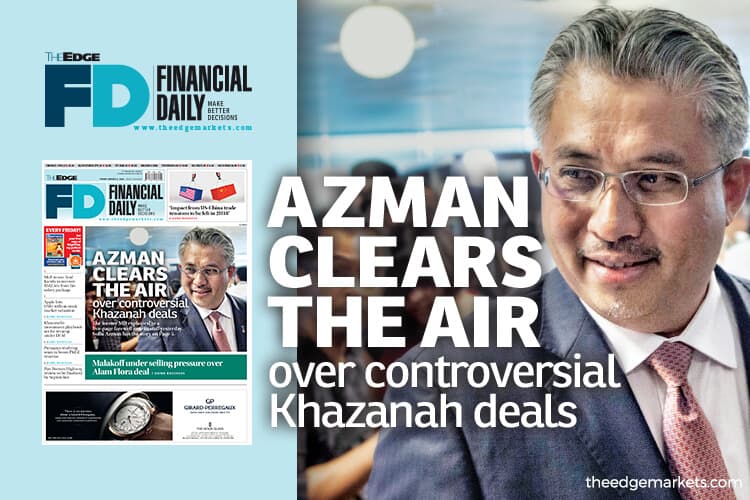
This article first appeared in The Edge Financial Daily on August 3, 2018
KUALA LUMPUR: In a five-page farewell letter to Khazanah Nasional Bhd staff yesterday, former managing director (MD) Tan Sri Azman Mokhtar made a clarification about two loss-making investments that the sovereign wealth fund had made which have been in the news following his resignation last week.
He said his key message in clarifying the two deals is to underscore that a proper sense of perspective is needed in assessing them.
The clarification was on both Khazanah’s investment in 2008 in global bank UBS — which he said resulted in a loss of RM1.7 billion and not RM3 billion as has been widely reported — and the RM80 million investment in online lingerie purveyor Zivame, which he said the fund decided to write off in its 2017 accounts as a conservative measure, as it sometimes does for technology investments.
In the UBS deal, in which Khazanah invested RM3.6 billion but has recovered 53.5% or RM1.9 billion, he said an internal review has cleared the investment of any wrongdoing. A significant factor for the losses, he said, was the negligence and breach of the shareholders’ agreement by the fund manager, Olivant, a charge the latter “ultimately admitted to, apologised and assumed responsibility for”.
While he admitted the UBS deal’s losses were “large”, they were “not exceptional” and were incurred “as part and parcel of investment operations which are always subjected to investment risks”. He also said many sovereign wealth funds suffered much larger losses on investments in global banking stocks.
As for the investment in India’s Zivame, which has drawn flak from Economic Affairs Minister Datuk Seri Mohamed Azmin Ali, Azman said Khazanah put in US$19 million (RM80 million) for a 22% stake in the online e-commerce company.
While Azman said the issue “makes for startling headlines and good copy”, he said the reality is that India has a billion consumers, half of that women, with rising incomes and even faster rising Internet and mobile penetration. Its male-dominated physical retail sector also resulted in a generally bad retail experience for women looking to buy undergarments.
In any case, Azman said Khazanah’s investment in India — code-named Project Billion — which went into various companies in the consumer sector, ranging from the sale of paints to jewellery, has generated over RM1 billion in realised and unrealised gains to date.
“Further, lest we forget that in Alibaba alone, another online e-commerce company, we have made more than RM6 billion gains and in fact, these gains alone are funding a multitude of technology investments, including in Zivame,” said Azman.
Khazanah’s fund size trebled under his tenure
He also highlighted that Khazanah had more than trebled its fund size during his tenure , from RM33.3 billion in May 2004 to RM115.6 billion as of end-2017, which translated into a compound annual growth rate of 9.6% per annum over the period.
The fund gained about RM100 billion between end-2008 and end-2017, he said. While the top 10 gainers made some RM92 billion, the 10 largest losses totalled about RM19 billion, led by Malaysia Airlines Bhd at RM8.4 billion, followed by semiconductor company Silterra Malaysia at RM5.5 billion and Olivant at RM1.7 billion.
“In investment terms, our gains have outnumbered our losses by a factor of 5:1. In footballing terms, it is like winning a game 5-1!” Azman said.
“So long as there was no wrongdoing or recklessness on the part of these — and other such investments — it is a given that an honest and proper investment strategy will always generate some losses,” he said, adding that the correct way to evaluate an investment portfolio is on a risk-adjusted basis and not just individual investment cases.
’Gaps and areas for improvement’
While recording his appreciation for the colleagues he had worked with, he also highlighted “gaps and areas for improvement” and pointed to companies the fund failed to turn around or turn around fully, like Malaysia Airlines and Silterra. He also noted some government-linked companies are still facing headwinds despite having grown under the fund’s 10-year transformation programme from 2005 to 2015.
On that note, he said the Transformation 2.0 programme the fund launched in January, together with its digital and innovation programme, TIDE, should continue to be the anchor programme for value creation.
“While steady progress has been made, we also need to follow through on the development of the catalytic sectors which by their nature takes long gestations and much stamina and perseverance,” he said. He also pointed to the seeding of new local and bumiputera companies like Time dotCom. “More of this can and should be done as we rebalance Malaysia Inc under the new government,” he added.
His letter to the staff was entitled “An ode to the real treasures”. For perspective, Khazanah is a Malay word for treasures.